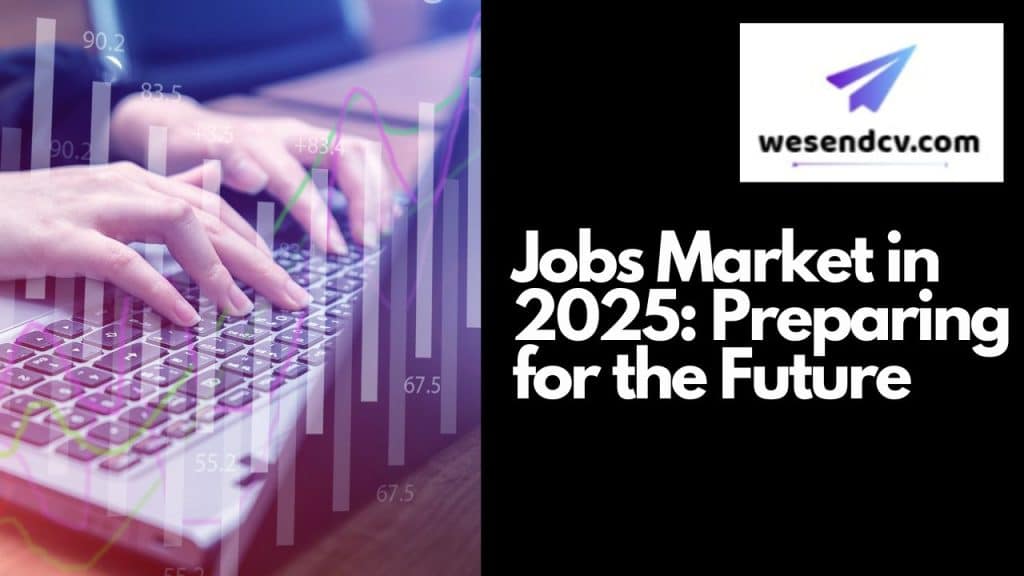Main Highlights of Content
ToggleIntroduction
The job market has undergone rapid transformation over the last few years, and 2025 promises to continue this trend with new roles emerging and others disappearing. As industries evolve with technological advancements, understanding future job market trends is critical for anyone planning a career or considering a career shift. Preparing for what’s next can mean the difference between staying ahead or getting left behind in a competitive employment landscape.
This article explores the job market predictions for 2025, focusing on the impact of technology, in-demand skills, regional job growth variations, and the importance of lifelong learning in an ever-evolving job environment.
Technological Advancements and Their Impact
The Role of Artificial Intelligence (AI) and Automation
Artificial Intelligence and automation are no longer futuristic concepts—they’re integral to industries today and will play an even bigger role by 2025. AI technology, including machine learning and robotic process automation, is reshaping how businesses operate, streamlining tasks that were previously performed by humans. AI can analyze data faster, automate repetitive tasks, and predict trends, which allows for increased productivity and efficiency.
However, as AI capabilities expand, roles focused on manual and repetitive tasks may decrease. Jobs that rely on specific skills like data entry, inventory management, and certain types of customer service may see a reduction in demand as companies adopt AI-driven systems.
Emergence of New Industries
New industries are emerging in response to technological advancements. Fields like AI development, biotechnology, renewable energy, and cybersecurity are creating jobs that didn’t exist a decade ago. The World Economic Forum’s Future of Jobs Report 2024 highlighted an anticipated surge in demand for AI and machine learning specialists, underscoring the growing need for individuals with expertise in these areas. These roles will not only be well-compensated but also crucial for driving innovation and efficiency across sectors.
Insights from Industry Leaders
As Insight Global and other industry leaders suggest, the key to thriving in 2025 and beyond will be adaptability. Individuals willing to adapt to new technologies and upskill in areas like AI, machine learning, and data analytics will find ample opportunities in a job market increasingly shaped by automation and technology.
In-Demand Skills and Occupations
Top Growing Occupations
According to the Bureau of Labor Statistics, several occupations are projected to experience significant growth by 2025. These include:
- Data Scientists: As data becomes central to business strategy, data scientists who can interpret, manage, and utilize this information will be highly sought after.
- Information Security Analysts: With the rise of cyber threats, businesses are placing greater emphasis on protecting their data and infrastructure, making this role essential.
- Medical and Health Services Managers: As healthcare demands increase, particularly in light of the recent pandemic, healthcare management roles will be crucial for managing operations and improving patient care outcomes.
Other roles, such as digital marketing specialists, renewable energy engineers, and blockchain experts, are also on the rise as businesses seek to stay competitive and environmentally conscious.
Importance of Digital Literacy and Analytical Skills
In addition to specific roles, skills like digital literacy, analytical thinking, and adaptability are becoming universally important. Digital literacy has expanded beyond basic computer knowledge to include an understanding of AI-driven tools, data analysis, and digital marketing.
Analytical skills, too, are invaluable as companies use data to inform decision-making. The ability to interpret data, draw insights, and apply them to business strategies is a skill that will continue to grow in demand.
Sustainability and Renewable Energy Sectors
Sustainability has moved from being a trend to an industry requirement, especially in response to climate change. According to Statista, there is expected growth in renewable energy roles, with positions in solar and wind energy, energy efficiency, and environmental consulting set to rise. As more countries and corporations commit to reducing their carbon footprints, job opportunities in these fields will become more widespread, making them a promising choice for individuals focused on sustainable development.
If you want to make your Resume ready for 2025 jobs then read here How to Format a Resume for ATS: Get Noticed in 2025 and 2025 Resume Styles: Which Format Works Best for Your Industry
Geographical Variations in Job Growth
Regional Job Market Trends
The job market doesn’t evolve uniformly across the globe, and job seekers should be mindful of geographical variations. In the United States, industries such as technology, healthcare, and renewable energy are expanding, creating high-paying roles in urban centers and tech hubs like Silicon Valley, Austin, and New York City.
In Europe, job market trends are influenced by regional policies and economic conditions. Countries like Germany and the Netherlands are leading in tech innovation, while others, like Denmark and Sweden, are heavily investing in green energy and sustainable development. Asia, particularly China and India, are experiencing growth in technology and manufacturing, with an increased demand for software engineers, data analysts, and manufacturing roles as these countries strengthen their economies.
Impact of Local Policies and Economic Conditions
Local policies and economic conditions significantly impact job opportunities. For instance, regions with strong support for renewable energy are likely to create more jobs in that sector, while those with a focus on tech innovation may see a rise in demand for AI and software development roles. Staying informed about the economic landscape and local policies in your region or desired job location can help you identify emerging job opportunities and position yourself accordingly.
Educational Pathways and Lifelong Learning
Continuous Upskilling and Reskilling
As industries evolve jobs market in 2025 expects more from you, and so too must the skills of the workforce. Continuous upskilling and reskilling will be essential for employees looking to stay relevant. Many professionals are choosing to update their skills in fields like AI, data science, and digital marketing. This shift not only helps employees retain their jobs but also opens doors to new opportunities.
New Educational Programs
Educational institutions and platforms are adapting to future job requirements by offering more targeted courses in trending fields. For instance, many universities now offer programs in renewable energy, AI, and machine learning. At the same time, organizations like Coursera and Udacity provide specialized online courses that allow students to earn certificates and learn at their own pace.
The Role of Online Courses and Certifications
With remote learning options widely available, online courses and certifications have become valuable tools for career advancement. They provide a cost-effective way to gain new skills and often come with flexible schedules, making them ideal for working professionals. Certifications in data analysis, cybersecurity, project management, and other high-demand fields can significantly enhance your resume and improve your employability.
Challenges and Considerations
Job Displacement Due to Automation and AI
As automation becomes more prevalent, concerns about job displacement are growing. Some roles may become obsolete as AI handles repetitive tasks more efficiently than humans. However, while some jobs will disappear, others will be created, especially those that require managing, designing, or programming these new technologies.
Addressing the Skills Gap
The rapid changes in job requirements have created a skills gap that employers are struggling to fill. To bridge this gap, educational institutions, governments, and companies are investing in upskilling and training programs. By participating in these programs, employees can keep their skills up-to-date and ensure they remain competitive in the job market.
If you want to generate skills for your Resume then use our Resume Skills Generator
Mental Health and Work-Life Balance
The increasing demands of the job market and the pressure to continuously update skills can lead to burnout and mental health issues. Employers are recognizing the importance of work-life balance and mental well-being, introducing initiatives like flexible work schedules, wellness programs, and mental health resources. It’s important for job seekers and employees to prioritize mental health as they navigate the evolving job market.
Conclusion
Technological advancements, evolving skill requirements, and geographical variations will shape the job market in 2025. Roles in AI, data science, healthcare, and renewable energy are set to grow, with digital literacy and analytical skills in high demand across industries. Continuous learning and adaptability will be crucial for anyone looking to secure and maintain employment in this new landscape.
Staying informed about industry trends, embracing new technologies, and actively developing relevant skills will give job seekers and professionals a competitive edge. The future job market is promising but requires proactive planning, a commitment to lifelong learning, and an awareness of the challenges and opportunities.
Read more about how to stay ahead in the jobs market in 2025 with your updated Resume How Often Should I Update My Resume in 2025 for Best Job Prospects







